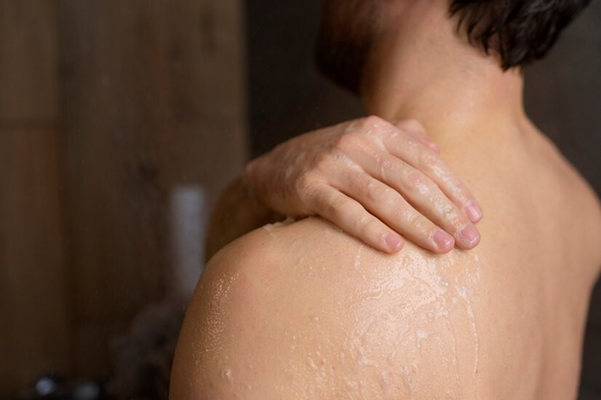Uncontrollable Itching After Shower: Causes and Remedies
In this article, we’ll explore the various causes of itching after showering, effective remedies, and when it might be necessary to seek medical advice.
While a little post-shower itch is sometimes normal, persistent or worsening itchiness can indicate an underlying skin condition or allergy. If the itching is accompanied by a rash, redness, or swelling, seeking medical advice is crucial. A doctor can diagnose the cause and recommend the most appropriate treatment plan.
Persistent Itching: A Sign of Underlying Issues
Persistent itching after showering could indicate an underlying skin condition or allergy. While occasional itching may be harmless, if it persists or worsens over time, it’s crucial to seek medical advice.
Skin conditions such as eczema, psoriasis, or allergic reactions to certain products can manifest as itching after showering. Ignoring persistent itching could lead to further discomfort and complications.
What Causes Itching After Shower?
If you find yourself uncontrollably scratching after a shower, it's important to understand the potential culprits. Here's a breakdown of some common causes and how to prevent them.
- Dry Skin
The most frequent cause of post-shower itchiness is dry skin. Hot water and harsh soaps can strip away your skin's natural oils, leaving it dry, tight, and itchy.
Prevention: Take lukewarm showers instead of hot ones. Opt for gentle cleansers and avoid harsh soaps.
- Eczema
This chronic skin condition causes irritation, inflammation, and itching, which can worsen after showering.
Prevention: Identify and avoid eczema triggers like harsh soaps, wool clothing, and stress. Regularly moisturize with a fragrance-free cream recommended by your doctor.
- Skin Allergies
You might be allergic to an ingredient in your soap, shampoo, or other shower products.
Prevention: Switch to fragrance-free, paraben free, sulfate free, and hypoallergenic shower products. Pay attention to when the itching occurs and try eliminating products one by one to identify the culprit.
- Reactions to Hard Water
Minerals in hard water can irritate the skin and cause itching.
Prevention: Install a water softener or use a shower filter to remove minerals.
- Seasonal Shift
Dry, cold winter air can exacerbate dry skin and itching.
Prevention: Use a humidifier to add moisture to the air, especially during winter. Moisturize more frequently during dry seasons.
- Fungal Infections
Warm, moist environments provide an ideal breeding ground for fungal infections like athlete's foot or jock itch.
Prevention: To prevent fungal infections, keep the skin clean and dry, especially in areas prone to sweating.
- Heat Rash
Hot showers, combined with humid conditions, can contribute to the development of heat rash, characterized by tiny red bumps and itching.
Prevention: Take cool showers and wear loose, breathable clothing.
Role of Seasonal Change with Body Itching
Seasonal changes can also influence body itching, particularly during the transition from winter to spring or summer. Dry, cold air in winter can exacerbate skin dryness, while increased humidity in warmer months may trigger sweat-related itching.
Adjusting skincare routines and staying hydrated can help mitigate seasonal itching. Consult your dermatologist to choose the best suited products for your skin to prevent any unforeseen allergies.
Treatment for Itching After Shower
- Moisturize: Apply a fragrance-free moisturizer while your skin is still damp to trap moisture. Look for ingredients like ceramides, hyaluronic acid, and oatmeal.
- Pat Dry, Don't Rub: Rubbing with a towel can further irritate your skin. Gently pat yourself dry instead.
- Cooling Relief: Apply a calamine lotion or a cool compress to soothe itching.
When to Consult a Doctor?
While most cases of itching after showering can be managed with home remedies, there are instances where medical intervention may be necessary. Consult a doctor if:
- Itching persists despite trying home remedies.
- Itching is accompanied by other symptoms such as rash, swelling, or difficulty breathing.
- Itching interferes with daily activities or affects sleep quality.
- There is a history of skin conditions or allergies.
Tips to Relieve Unbearable Itching After Shower
Here are some additional tips to combat post-shower itch:
- Avoid Hot Showers: Opt for lukewarm water to preserve your skin's natural oils.
- Limit Shower Time: Long showers can strip away moisture. Aim for shorter showers (around 10 minutes).
- Wear Loose-Fitting Clothes: Tight clothing can irritate itchy skin. Opt for loose-fitting, breathable fabrics like cotton.
- Reduce Stress: Stress can exacerbate skin conditions like eczema. Practice relaxation techniques like yoga or meditation.
- Product Selection: Choose fragrance-free, hypoallergenic shower products.
- No Scratching: Avoid scratching, as it can further irritate the skin.
- Nail Grooming: Keep nails short to minimize skin damage from scratching.
Conclusion
Itching after a shower can be a frustrating experience, but by understanding the causes and implementing these simple remedies, you can keep your skin feeling comfortable and prevent the urge to scratch.
Remember, if the itching persists or worsens, don't hesitate to consult a doctor for proper diagnosis and treatment. With the right approach, you can enjoy the refreshing feeling of a shower without the unwanted itch.
